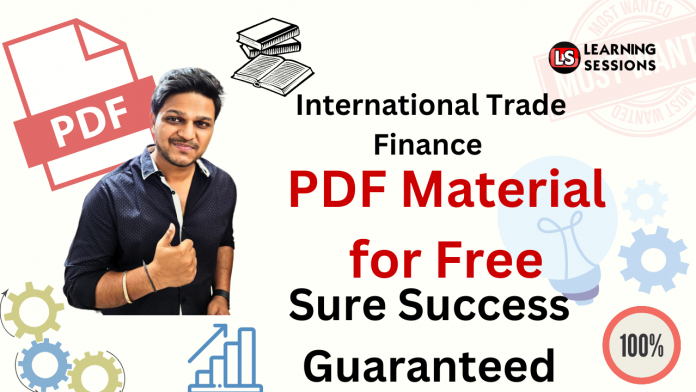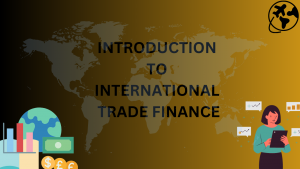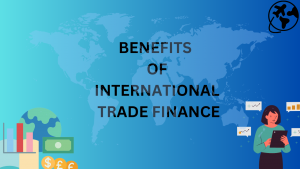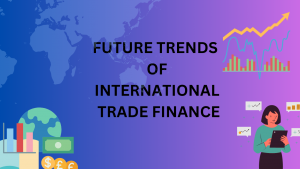Introduction: International Trade Finance
International Trade Finance also referred as Cross-border trade is crucial for the growth of the global economy. International Trade Finance involves a few risks and uncertainties that may affect both importers and exporters.
Understanding International Trade Finance
The term “International Trade Finance” refers to the financial assistance provided by banking institutions or other kinds of financial organisations to companies that import or export goods using a wide range of financial instruments, such as bank guarantees and letters of credit, to enable them to conduct business without facing financial challenges.
📚 CAIIB Study Resources 📚
👉 Check Here
👉 Check Here
👉 Check Here
👉 Get Tests Here
👉 Check Here
👉 Click Here
👉 Click Here
Importers, exporters, banks, trade finance firms, and other parties involve themselves in international trade financing.
1. Who Makes Use of Foreign Trade Finance?
Importers, exporters, merchants, farmers, suppliers, etc. are examples of parties who make use of international trade finance.
2. Who is a trade finance provider?
For their corporate clients, a number of financial institutions other than financial institutions offer safe and reliable cross-border finance services.
3. Institutions of finance
Many financial organisations concentrate on handling different financial products for their business clients, including borrowings, investments, savings, and even more.
Enterprises can get advance money from lending institutions with an authorised operating licence if they require it for existing corporate operations.
4. Money-Making Middlemen
In addition to the above mentioned financial institutions, a number of financial mediators contract with financial companies to assist international trade transactions. Examples of these intermediaries include agencies, brokers, sales professionals and third-party service providers.
Instruments of International Trade Finance
| Instruments of ITF | Definition |
| Letters of Credit (LCs) | Once certain requirements are met, a bank will be eternally committed to making settlement on behalf of the importer under the terms of an LC. They lessen the possibility of pay failure by giving exporters the confidence that they will be paid once the conditions of Letters of Credit are met. |
| Export Credit and Insurance | Export-oriented lending organisations and independent insurers provide coverage for export credit in order to shield exporting businesses from the danger of abroad-based purchaser’s pay failure and political hazards involved in international trade. |
| Documentary Collections | In order to assure a secure transmission of paperwork and funds amongst the exporter and the importer, collections of documentation employ banks as middlemen. While this technique comes with a higher level of risk for the exporter but serves as an affordable alternative to LCs. |
| Trade Financial Loans | These loans offer short-term financing to companies involved in global commerce, taking care of working capital requirements, product purchases, and pre-shipment costs. They assist close the gap between output and payment by ensuring liquidation across the whole trading cycle. |
So, by keeping all the above mentioned key instruments in mind, Learning Sessions is providing free pdf study material on International Trade Finance. These PDFs are made to be detailed, organised and simple to use so that students may easily get the information they require.
You can download the free pdfs made by the professional professors of Learning Sessions below:
| S.NO. | Paper | Module | Chapter | Action |
| 1 | ITF | A | Financial Markets | Download |
| 2 | ITF | A | Treasury | Download |
| 3 | ITF | A | Scope and Functions of Treasury Management | Download |
| 4 | ITF | B | Liquidity Management | Download |
| 5 | ITF | B | Integrated Treasury | Download |
| 6 | ITF | B | Treasury Instruments | Download |
Benefits of International Trade Finance
a) Risk Reduction: Trade financing tools reduce risks related to global trade, such as failure to pay, exchange rate volatility, and instability in politics. They give importers and exporters certainty, encouraging reliability and trust in international business dealings.
b) Market Expansion: By lowering financial obstacles and offering required assistance, international trade financing enables companies to enter emerging markets. It promotes diversifying its market, creating opportunities for greater development and financial success.
c) Better Cash Circulation: Trade funding enables effortless cash flow by granting the availability of liquidity and short-term funds, as well as enabling rapid payment of traders and order fulfilment.
d) Competitive Advantage: Making efficient utilisation of trade financing techniques can give enterprises an edge over their competitors by allowing purchasers to pay with more lenient terms, increasing their appeal in overseas markets.
Few other benefits of International Trade Finance are as follows:
- Through trade and commerce, businesses can expand or strengthen their operations across borders and make money.
- It aids businesses in lowering the dangers of financial inability to pay.
- Additionally, it improves the bond between the two parties.
- Clients can contact traders about placing bigger orders or ask for more inventory.
Future Trends: International Trade Finance
Numerous significant developments are influencing the near future of this industry as the framework of international trade finance keeps on evolving. Technological improvements, shifting market dynamics, and the demand for improved and environmentally friendly trade financing solutions are what are driving these changes. Observe the following patterns in the coming years:
- Advanced technology: The sector is about to undergo a change thanks to the introduction of blockchain technology. Added safety, accessibility, and accountability provided by blockchain will lower the probability of fraud and boost the effectiveness of trade finance operations. Smart contract technologies will offer the ability to streamline and simplify trade procedures, such as keep track of transfers, payment settlements and inspections for compliance.
- Artificial Intelligence and Machine Learning: The application of artificial intelligence (AI) and machine learning (ML) technology will trade finance operations. Massive amounts of data related to trade may be analysed using AI-powered algorithms, which can also spot patterns and offer current information on reliability, fraud prevention, and trade risk mitigation. Forecasting models can be improved by ML algorithms as well, allowing for a better assessment of trade financial risk and promoting quicker and more well-informed decision-making.
- Expansion in Emerging Markets: The global trade finance will be impacted in every way imaginable by the expansion in emerging markets. The potential risk and value of current big international trade will expand as a result of the rising markets, which will also encourage the formation of a brand-new generation of creative businesses.
The currents situation of International Trade Finance is mentioned in the article named Certificate Course on MSME.
Conclusion: Learning Sessions
Learning Sessions significantly contributes to increasing financial literacy and boosting information diffusion by providing these tools without charge. The study material provides students with the fundamental theories, guidelines, and tools of international trade finance, empowering them to confidently negotiate the complexities of cross-border transactions.
Learning Sessions is delighted to help aspiring bankers succeed by giving them useful study material including the mock tests and previously asked questions since we really think that knowledge is the key to opening doors. We encourage students to go through our library of free bank promotional study guides in PDF format and set out on a path of development and success.
Also Like:








